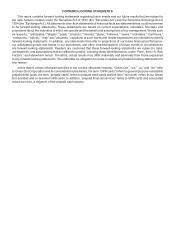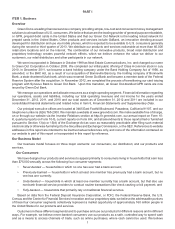Green Dot 2012 Annual Report Download - page 19
Download and view the complete annual report
Please find page 19 of the 2012 Green Dot annual report below. You can navigate through the pages in the report by either clicking on the pages listed below, or by using the keyword search tool below to find specific information within the annual report.9
In addition, we must at all times maintain “permissible investments” in an amount equivalent to all “outstanding
payment obligations.” While, technically, the outstanding payment obligations represented by the balances on our card
products are liabilities of the issuing bank, it is possible that some states will require us to maintain permissible
investments in an amount equal to the outstanding payment obligations of the bank that issues our cards. The types
of securities that are considered “permissible investments” vary from state to state, but generally include cash and
cash equivalents, U.S. government securities and other highly rated debt instruments.
Escheatment Laws
Unclaimed property laws of every U.S. jurisdiction require that we track certain information on our card products
and services and that, if customer funds are unclaimed at the end of an applicable statutory abandonment period, the
proceeds of the unclaimed property be remitted to the appropriate jurisdiction. We have agreed with the banks that
issue our cards to manage escheatment law compliance with respect to our card products and services and have an
ongoing program to comply with those laws. Statutory abandonment periods applicable to our card products and
services typically range from three to seven years.
Privacy and Information Safeguard Laws
In the ordinary course of our business, we collect certain types of data, which subjects us to certain privacy and
information security laws in the United States, including, for example, the Gramm-Leach-Bliley Act of 1999, or the GLB
Act, and other laws or rules designed to regulate consumer information and mitigate identity theft. We are also subject
to privacy laws of various states. These state and federal laws impose obligations with respect to the collection,
processing, storage, disposal, use and disclosure of personal information, and require that financial institutions have
in place policies regarding information privacy and security. In addition, under federal and certain state financial privacy
laws, we must provide notice to consumers of our policies and practices for sharing nonpublic information with third
parties, provide advance notice of any changes to our policies and, with limited exceptions, give consumers the right
to prevent use of their nonpublic personal information and disclosure of it to unaffiliated third parties. Certain state
laws may, in some circumstances, require us to notify affected individuals of security breaches of computer databases
that contain their personal information. These laws may also require us to notify state law enforcement, regulators or
consumer reporting agencies in the event of a data breach, as well as businesses and governmental agencies that
own data. In order to comply with the privacy and information safeguard laws, we have confidentiality/information
security standards and procedures in place for our business activities and with network acceptance members and our
third-party vendors and service providers. Privacy and information security laws evolve regularly, requiring us to adjust
our compliance program on an ongoing basis and presenting compliance challenges.
Banking Regulations
We became a bank holding company in December 2011, as a result of our acquisition of Bonneville Bancorp, the
holding company of Bonneville Bank, a state-chartered Utah bank, which was renamed Green Dot Bank after the
acquisition. We and our subsidiary bank are extensively regulated under federal and state laws, which, in general,
results in increased compliance costs and other expenses, as we and our subsidiary bank are required to undergo
regular on-site examinations and to comply with additional reporting requirements. As a bank holding company, we
are subject to the supervision of, and inspection by, the Federal Reserve Board and are subject to certain regulations
which, among other things, restrict our business and the activities in which we may engage. Our existing business
activities and currently proposed business activities are not materially restricted by these regulations.
Activities. Federal laws restrict the types of activities in which bank holding companies may engage, and subject
them to a range of supervisory requirements, including regulatory enforcement actions for violations of laws and
policies. Bank holding companies may engage in the business of banking and managing and controlling banks, as
well as closely related activities. In addition, financial holding companies may engage in a wider set of activities,
including with respect to securities activities and investments in companies engaged in nonbanking activities. The
business activities that we currently conduct are permissible activities for bank holding companies under U.S. law, and
we do not expect the limitations described above will adversely affect our current operations or materially restrict us
from engaging in activities that are currently contemplated by our business strategies. It is possible, however, that
these restrictions could limit our ability to enter other businesses in which we may wish to engage at some time in the
future. It is also possible that in the future these laws may be amended in ways, or new laws or regulations may be
adopted, that adversely affect our ability to engage in our current or additional businesses.
Even if our activities are permissible for a bank holding company, as discussed under “— Capital Adequacy” below,
the Federal Reserve Board has the authority to order a bank holding company or its subsidiaries to terminate any
activity or to require divestiture of ownership or control of a subsidiary in the event that it has reasonable cause to
believe that the activity or continued ownership or control poses a serious risk to the financial safety, soundness or
stability of the bank holding company or any of its bank subsidiaries.
























